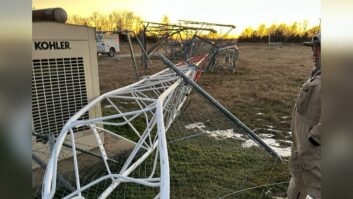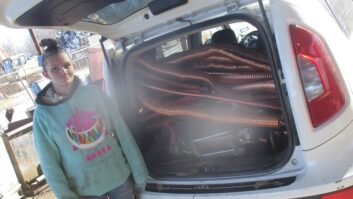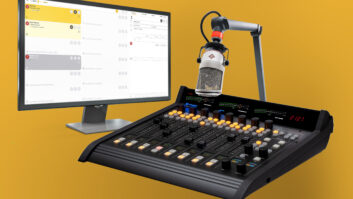TALLAHASSEE, Fla.
It’s difficult and not desirable to build or operate a modern transmitter site without at least some copper. However, that shiny wire and tubing is attractive to thieves who steal it and resell it to scrap metal dealers for anywhere from $2.50 to $3 a pound.
Florida legislators are eyeing get-tough measures to stop copper thieves from ransacking vulnerable and often remote broadcast sites and reselling the scrap metal.
The huge worldwide demand for copper and other non-ferrous metals has triggered what some say is an epidemic of scrap metal thievery, which in turn has led as many as 20 states to adopt laws that make it more difficult for the scofflaws to resell their metal, according to the scrap metal industry.
Radio broadcasters here and across the country have been the target of numerous copper hit and runs with air conditioner units, ground systems, transmission lines, utility wires and transmitters targeted by the copper bandits, say those familiar with the problem.
In Florida, religious outlet WTLN(AM), Orlando, was knocked of the air in January when vandals ripped copper from the station’s transmitter site. Similar reports have come from broadcasters across the nation as metal prices have soared the past two years.
Minimize losses
Broadcast engineers are making efforts to eliminate attractive targets and minimize losses.
Clear Channel has been hit numerous times all over the country, said Michael Golchert, AM field engineer for the company.
“We’ve lost HVAC units, copper buss bars, copper grounding straps and even a four-bay ERI rototiller antenna to thieves,” Golchert said. “Most markets that have been hit or feel that they are vulnerable have increased security around their facilities.”
Counter-measures include keyless passkey security systems, motion sensors inside transmitter buildings, and low-light cameras inside and outside facilities, Golchert said.
Clear Channel stations have taken steps to improve relationships with local law enforcement, he said, in hopes of increasing patrols near remote transmitter sites.
Gary Kline, corporate director of engineering for Cumulus, cited numerous copper theft incidents, including a January event at WICC(AM) in Bridgeport, Conn., where thieves stole copper tubing that supplies propane to the generator.
“Copper tubing was ripped off the regulator and tubing was pulled from the building,” wrote Chief Engineer Ed Butler of WICC in a report to Kline. “At some point I think we should look into adding 12-foot fences with razor wire around the buildings.”
Sterling Davis, vice president of engineering for Cox Radio, said his radio stations have been hit in several markets.
“Stations are reviewing their security systems to see where we can do better. Really just standard security measures,” Davis said.
Brazen Florida thieves
Davis recalled building the KRXI(TV) transmitter sites on a remote mountain near Reno, Nev., and painting external transmission line gray to devalue it a little in the eyes of thieves.
“I’ve also heard that using tar on exterior ground strap systems helps stop theft because it renders the copper worthless for re-sale,” Davis added.
In Florida, brazen copper thieves have been visiting unmanned transmitter sites and gobbling up copper transmission line and coax regularly, said Steve Fluker, director of engineering for Cox Radio in Orlando.
He supports a legislative measure proposed in that state to make it more difficult for vandals to sell stolen copper and other scrap metal.
The legislation, introduced by state Rep. Scot Randolph, would require recycling centers in the state to copy the photo ID of the seller with every recorded sale.
“I would go further and say the law should require the recycling company to delay the check by 10 days. If a theft is reported this would give authorities time to check the recyclers and possibly catch the thieves when they return for their money,” Fluker added.
Milford Smith, vice president of engineering at Greater Media, recounted an incident at WPEN(AM), Philadelphia in 2007 during a power increase project when thieves stole “a fair amount of copper strap and wire” stored in a garage prior to installation.
“Obviously someone in the neighborhood witnessed the delivery. After that, we posted a security guard at the site whenever work was not actively taking place,” Smith said.
Smith recommends that broadcasters, during construction projects, keep copper materials out of sight and ideally off site until just before is it installed.
“Unfortunately, copper theft is an all too common reality faced by broadcasters nationwide,” said NAB Executive Vice President of Media Relations Dennis Wharton. “It is an issue NAB has tried to raise awareness of over the years. We continue to encourage stations to protect their assets.”
What tricks have you employed to discourage metal theft? Write to [email protected].












